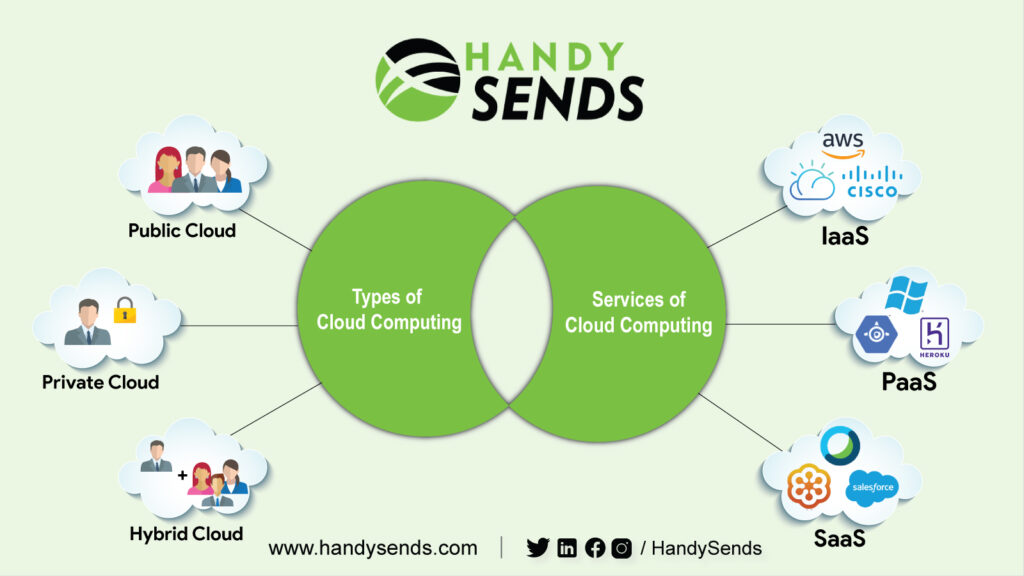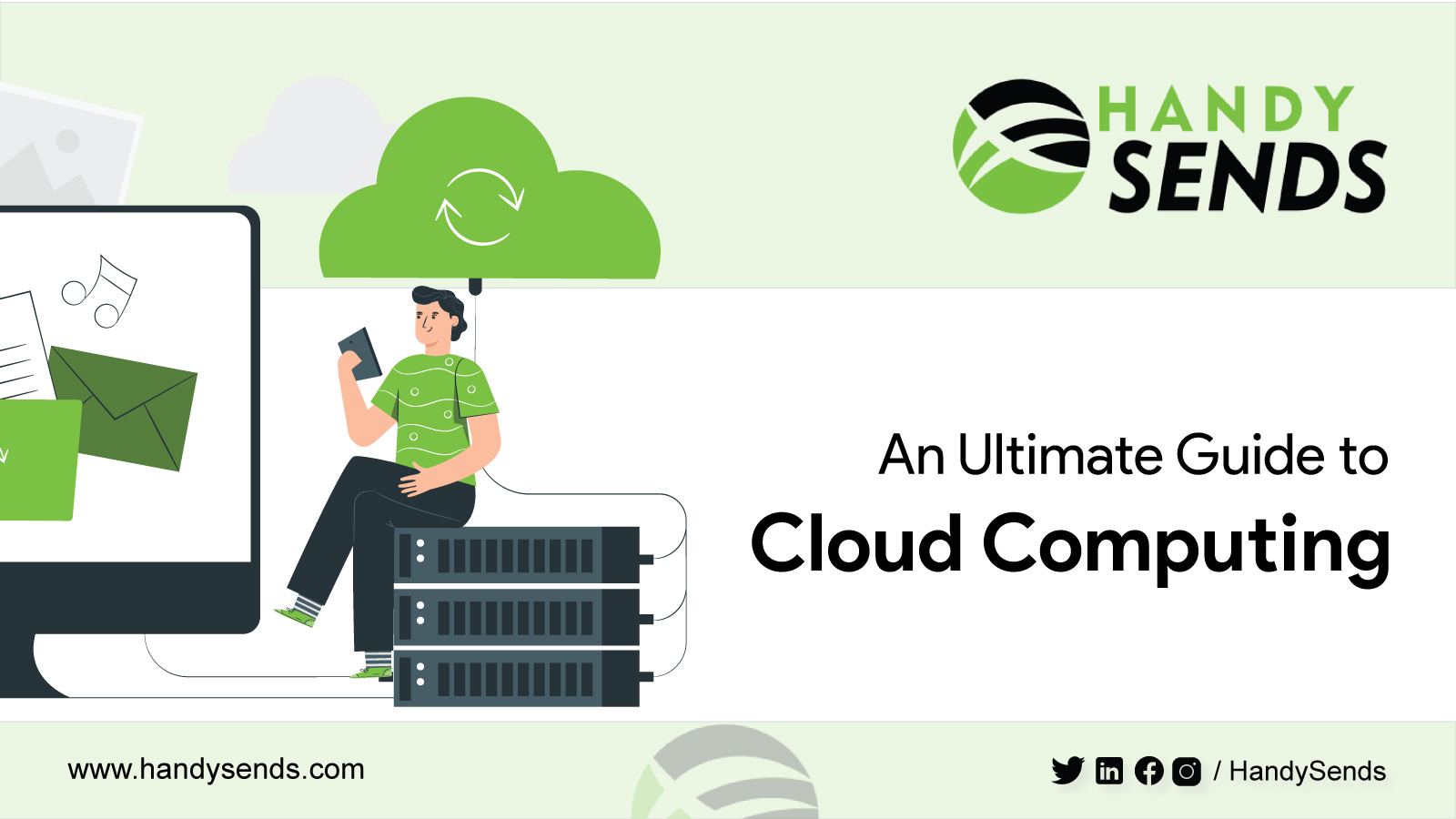What is Cloud Computing?
Cloud computing is the delivery of computer services via the Internet (“the cloud”) in order to provide faster advancement, adaptable assets, and economies of scale. You only pay just for cloud services you use, helping bring down your operating expenses, run your infrastructure more effectively and scale as your business needs change.
Types of Cloud Computing
Public Cloud
The public cloud is the exemplary cloud computing model, where users can get a vast pool of computing control over the web, and a third-party cloud service provider conveys the cloud service over the web. Cloud provider owns and manages all hardware, software, and other supporting frameworks in a public cloud. The Cloud computing providers have immense measures of computing power, which they share out between an enormous number of users – the multi-tenant environment. One of the critical advantages here is the capacity to scale a service rapidly.
Customers pay only for the CPU cycles, stockpiling, or spare capacity they consume. Driving public cloud service providers are Amazon Web Services (AWS), Microsoft Azure, IBM, and Google Cloud Platform.
Private cloud
A private cloud is a cloud environment in which a single customer has exclusive access to all cloud frameworks and computing resources. With a private cloud, an organization assembles and keeps up with its basic cloud framework. Organizations can handle precisely where their data is being held and can build the infrastructure in the manner they need. Private cloud combines a lot of the advantages of cloud computing—including versatility and adaptability.
Many organizations pick private cloud over public cloud since the private cloud is a simpler way to meet their regulatory compliance prerequisites. Others choose private cloud as they manage confidential reports, licensed innovation, clinical records, financial information, or other delicate information.
Some organizations likewise pay third-party service providers to host their private cloud. A private network hosts the services and framework of a private cloud.
Private cloud technologies and vendors are VMware and OpenStack.
Hybrid cloud
A hybrid cloud is a mix of public cloud and private cloud environments, with automation between the two. Organizations can run strategic workloads or delicate applications on the private cloud and use the public cloud to deal with workload spikes. It gives an organization the adaptability to pick the ideal cloud for every application or workload and to move them openly between the two clouds as conditions change. The objective of a hybrid cloud is to create a computerized, adaptable environment that exploits all that a public cloud framework can give while keeping up with command over crucial information.
This empowers the organization to meet its technical and business goals more viably and cost-efficiently than it could with public or private cloud alone. This kind of model advances the client’s framework, compliance, and security.

Cloud Computing Services
Infrastructure as a service
Infrastructure as a service (IaaS) gives on-demand access to principal computing assets-physical and virtual servers, networking, and storage over the web on a pay-as-you-go basis. Customers have an allocated storage limit and can begin, stop, access, and configure the virtual machine and storage as needed. IaaS providers offer small, medium, huge, extra-enormous, and memory or compute streamlined instances, as well as permitting customization of instances, for different workload needs.
IaaS empowers customers to scale assets dependent upon the situation, diminishing the requirement for high direct capital expenditures or pointless on-premises or possessed infrastructure and for overbuying assets to oblige periodic spikes in use. The service provider likewise deals with the maintenance and services of your IT infrastructure, including CPU processing, memory, information storage, and network connectivity. IaaS gives you the most significant level of adaptability and management control over your IT assets.
Rather than SaaS and PaaS (and even more current PaaS computing models like containers and serverless), IaaS gives the customers the most minimal level control of computing assets in the cloud. Popular IaaS suppliers are Amazon Web Services, Google Compute Engine, Microsoft Azure, IBM Cloud, and Cisco Metapod.
Platform as a service
Platform-as-a-service (PaaS) is viewed as the most complex of the three layers of cloud-based computing. PaaS imparts some similarities to SaaS, the difference being that as opposed to delivering software on the web, but a platform for creating software that is delivered through the web.
PaaS providers give these pre-setup platforms to the organizations according to their prerequisites. Organizations don’t have to invest in building and maintaining the architecture of the platform. It is the bundle of both, framework, the building blocks that are needed for creating an application and the services, to authority over the technical parts of your computing arrangement, and the capacity to redo to suit their necessities.
PaaS permits you to focus on the deployment and the board of your applications. Customers access these tools over the web using APIs, web-based interfaces, or gateway software. Popular PaaS suppliers are Windows Azure, Google App Engine, Apache Stratos, Heroku, AWS Elastic Beanstalk, and Salesforce’s Lightning Platform.
Software as a service
Software as a service (SaaS) otherwise called cloud-based software or cloud applications is application software that is hosted in the cloud and that you access and use through the web or an API that integrates with your desktop or versatile working framework. Customers connect to the application over the web, mostly with a web browser on their mobile, tablet, or PC.
SaaS is the delivery model for most business software today—there are countless SaaS solutions accessible, from the most engaged industry and departmental applications to incredible enterprise software databases and Artificial Intelligence software.
Along with the cost savings, time-to-esteem, and versatility advantages of the cloud, SaaS offers Automatic updates and Protection from data loss. Popular SaaS suppliers are Google Apps, Cisco WebEx, Salesforce, Citrix GoToMeeting, and Workday.
Benefits of Cloud Computing
- Cost effective
- Fast Implementation
- Global scale
- Productivity
- Performance
- Reliability
- Security
- 24/7 availability
- Carbon footprint
- Disaster recovery
- Maintenance free
Conclusion
Cloud computing offers incredible advantages of working from any place across the globe, as long as you have a web connection. Indeed, even while utilizing the basic cloud benefits that offer portable applications, they do not impede the gadget used. This prompts a decline in the number of servers, cost of software licenses, and staff. Thus, decreasing the general IT cost altogether without upsetting the undertaking working.



Thanks to my father who shared with me on the topic of this web site, this blog is
really amazing.
Here is my blog Marietta
Thank you!
Great post. I will be experiencing a few of these issues as well..
Here is my page; Dorris
Thank you!
You can certainly see your skills within the work you write.
The world hopes for even more passionate writers like you who aren’t afraid to say how they
believe. All the time follow your heart.
My web page :: Lyda
Thank you!
Helpful info. Fortunate me I discovered your web site by
chance, and I’m surprised why this twist of fate didn’t took place earlier!
I bookmarked it.
my web site Sunny
Thank you!
Subscribe to our blog for the latest blog updates.
Hurrah! At last I got a web site from where I be
able to actually obtain helpful data regarding my study and knowledge.
my web page – Dorothy
Hey are using WordPress for your site platform? I’m new to the blog
world but I’m trying to get started and set up my own. Do you need any coding knowledge to make
your own blog? Any help would be greatly appreciated!
Also visit my web site: Cherie
Yes! We use WordPress for our blog platform. We don’t need coding knowledge to work on WordPress.
Thank you!
Wonderful blog! I found it while surfing around on Yahoo News.
Do you have any suggestions on how to get listed in Yahoo News?
I’ve been trying for a while but I never seem to get there!
Cheers
my webpage – Darrin